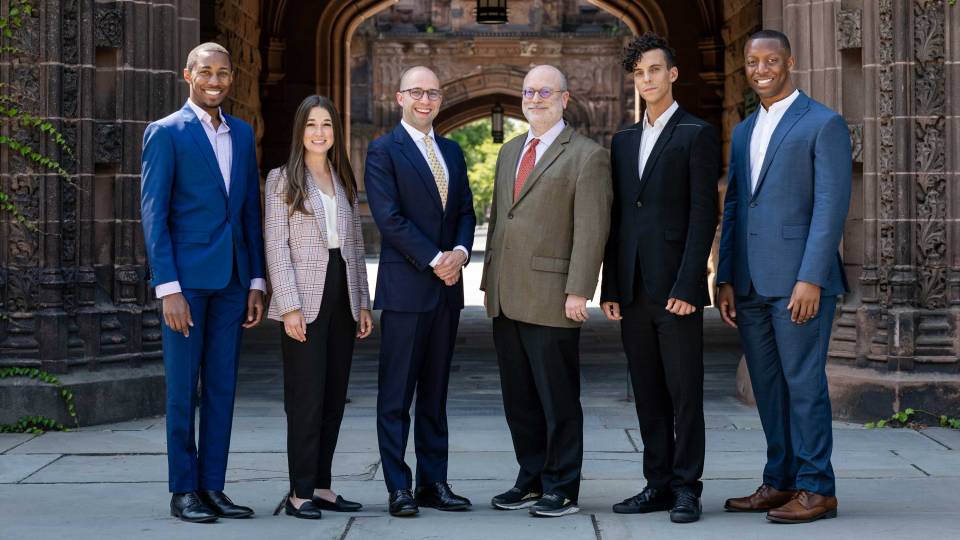From the Nov. 13, 2006, Princeton Weekly Bulletin(Link is external)
Five new postdoctoral scholars have joined the Society of Fellows in the Liberal Arts(Link is external) this year.
The society, created in 2000 by a gift from Charter Trustee Lloyd Cotsen, is an interdisciplinary community that seeks to bring innovative approaches to scholarship and teaching at Princeton. It offers outstanding young scholars who have recently received their Ph.D. the opportunity to enhance their teaching and research over a period of three years.
The society is led by Leonard Barkan, the Arthur W. Marks ’19 Professor of Comparative Literature. It includes Princeton faculty members who serve as faculty fellows and meet regularly with the Cotsen fellows in the Joseph Henry House for informal and formal discussions, seminars and lectures. The full complement of 14 postdoctoral fellows is drawn from a range of disciplines in the humanities, related social sciences and natural sciences.
The Cotsen Fellows for 2006-09 were selected from a pool of more than 600 applicants. They teach half-time in their academic department or program or in the Humanities Council and pursue their own research. They are:
Mendi Obadike, a postdoctoral fellow in race/ethnicity studies and lecturer in English. She received her Ph.D. from the Program in Literature at Duke University in 2005 with a dissertation titled “Low Fidelity: Stereotyped Blackness in the Field of Sound.” Her research develops the concept of the “sonic stereotype” to examine the representations of blackness as an element of sound — and not only vision — in American music, film and literature. While at Princeton, Obadike is revising and expanding her dissertation for publication. She also is teaching a seminar in the fall on stereotyped blackness and will lead a freshman seminar in the spring on “The Idea of Black Music.”
Miriam Petty, a postdoctoral fellow in race/ethnicity studies and lecturer in English. She earned a Ph.D. in American studies from Emory University in 2004. Her dissertation, “Doubtful Glory: 1930s Hollywood and the African American Actor as Star,” examines four African American film actors as case studies for an analysis of black stardom in 1930s Hollywood. The focus of her work is the role of American media and popular culture in shaping conceptions of race and ethnicity. While at Princeton, she is continuing research into African American cultural production, examining contemporary black folk culture and political rhetoric in the plays of the “Chitlin’ Circuit Theater.” She also is teaching courses on African American cultural practices and on the figure of the “Celluloid Mammy.”
Andrew Quintman, a Cotsen-Mellon Postdoctoral Fellow in the History of the Book and lecturer in religion. He received his Ph.D. in Buddhist studies earlier this year from the University of Michigan with a dissertation titled “Milarepa’s Many Lives: Anatomy of a Tibetan Biographical Corpus.” His dissertation explores the extensive body of early literature recording the life story of Tibet’s acclaimed 11th-century meditator and poet Milarepa, seeking to broaden existing notions of Tibetan hagiography by examining the relationship between sacred life stories and their narrative representations. At Princeton he is exploring the role of visual and ritual media in the production and promulgation of Tibetan life writing. He also is working on a new translation of “The Life of Milarepa” to be published by Penguin Classics. He is teaching a freshman seminar this fall titled “From Sacred Landscape to Shangri-la: The Imagination of Tibet” and will lead a course in religion on “Sacred Biography in Buddhism” in the spring.
Sarah Ross, a Behrman-Cotsen Postdoctoral Fellow and lecturer in history. She earned her Ph.D. in history from Northwestern University earlier this year. Her dissertation, “The Birth of Feminism: Woman as Intellect in Renaissance Italy and England,” won the Harold Perkin Prize for the history department’s best dissertation of the year. Ross describes her research project as “an experiment in collective biography and intellectual history” in which she develops a model of “the intellectual family” to chart the rise of women humanists in Italy and England from 1400 to 1680. At Princeton she is part of the faculty team in humanistic studies this fall offering interdisciplinary approaches to the intellectual and cultural history of Europe. In the spring, she will lead a seminar in the Department of History on the Renaissance.
Argyro (Iro) Tasitsiomi, a Spitzer-Cotsen Postdoctoral Fellow. She received her Ph.D. in astrophysics from the University of Chicago in 2005. Her thesis focused on cosmology, and more specifically on topics relating to supersymmetric dark matter and large-scale structure formation, as well as the evolution of the universe and how this can be observed via Lyman-alpha emitters. At Princeton, where she holds a Lyman Spitzer Jr. Fellowship, she is continuing investigations along the lines of her previous research as well as in new directions. In 2006-07 she will teach a graduate seminar on current issues in cosmology.


